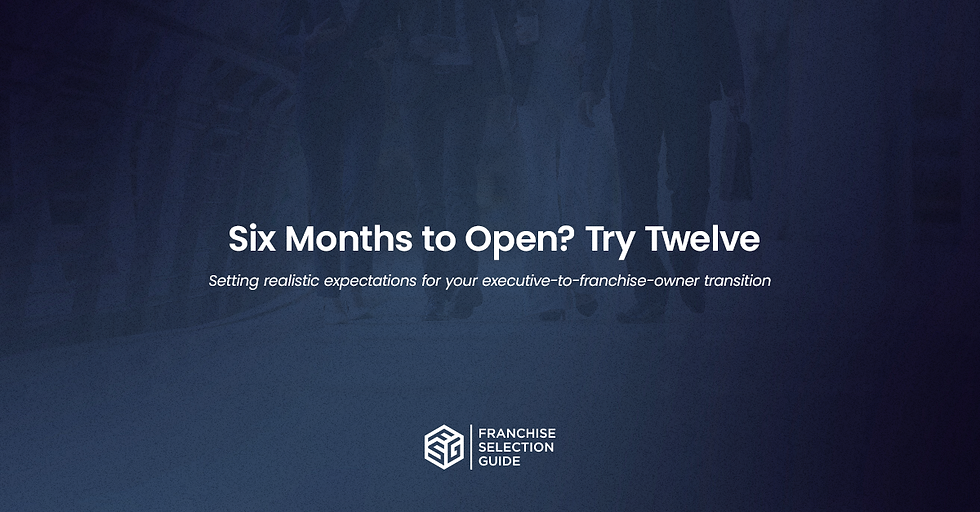Why Your Franchise Transition Will Take Longer Than You Think (And That's Actually Good)
- Matt Tiefenbrunn

- Aug 16, 2025
- 3 min read

The Reality Behind Executive Franchise Transitions
You've hit your ceiling in corporate. The next promotion isn't coming, or maybe you're tired of building someone else's wealth. You decide to move to franchise ownership and figure six months should cover research, planning, and opening your doors.
Here's what seasoned franchise owners wish they'd known: executive-to-franchise transitions always take longer than high achievers first estimate.
Why Executives Underestimate Transition Timelines
As a successful executive, you're used to moving quickly. You've managed project timelines, hit quarterly targets, and completed strategic initiatives on schedule. This experience creates confidence in your ability to quickly navigate career transitions.
The issue isn't your execution skills. The challenge is that franchise transitions involve step-by-step phases that can't be compressed like corporate projects.
Common Transition Timeline Extensions
Executives often plan four months total: two for research, two for setup. In practice, transitions often extend to 12-14 months. Why? Initial research reveals better opportunities than first impressions suggest. Site selection requires multiple attempts to find good locations. Financing involves additional documentation beyond initial estimates.
Many executives assume their business background enables faster execution. However, working with franchise consultants to properly evaluate opportunities typically requires 6-8 weeks. Legal review, territory analysis, and franchisee validation often extend research phases to 4-5 months.
Most executives attempt to multitask their transition while maintaining full-time employment. This approach encounters practical challenges: franchisee interview calls during business hours, Discovery Day attendance requirements, and site visits that conflict with work schedules.
The Hidden Phases of Franchise Transitions
Working with a franchise consultant isn't a one-week process. Quality consultants spend 4-6 weeks understanding your goals, financial capacity, and market preferences before presenting suitable opportunities. This foundation work proves crucial later.
Franchise research and validation requires 3-4 months minimum. Reviewing Franchise Disclosure Documents, conducting franchisee interviews, attending Discovery Days, and performing market analysis can't be rushed without risking poor decisions.
Financing and legal review adds 6-8 weeks. Even with pre-approval, final SBA loan processing, franchise agreement review, and territory approval involve multiple parties operating on different timelines.
Site selection and buildout varies dramatically by concept. Retail locations require lease negotiations, permits, construction, and equipment installation that often extends 4-6 months beyond initial estimates.
Planning for Extended Timelines
Plan 12-18 months for complete executive-to-franchise transitions, not 6 months. This isn't inefficiency. It's realistic planning that reduces stress and improves decision quality.
Build transition phases: exploration and consultation (months 1-2), research and validation (months 3-6), legal and financing (months 7-9), development and opening (months 10-12+).
Consider working arrangements during transition. Many executives negotiate part-time consulting with current employers or take planned breaks to properly focus on franchise development.
Budget for extended personal expenses during transition periods. Your franchise income won't start immediately. Quality transitions require time investment that impacts current earnings.
The Value of Professional Guidance
Franchise consultants speed up certain phases while ensuring thoroughness in others. They help you avoid obvious mismatches early while providing industry insights that prevent costly mistakes later.
Working with experienced professionals during legal review, site selection, and financing often prevents timeline extensions caused by unfamiliarity with franchise-specific requirements.
Quality consultants also help manage your expectations throughout the process. This prevents frustration when normal delays occur.
The Long-Term Perspective
Franchise ownership typically spans 10-20 years. Whether you open in month eight or month fifteen becomes irrelevant compared to selecting the right opportunity and executing a solid launch.
Extended transition periods often reveal better opportunities or prevent major mistakes. Many successful franchise owners report their final choice emerged months into their transition process.
Rushed transitions often lead to poor location choices, inadequate financing, or operational struggles that impact long-term performance.
Strategic Recommendations
Start with realistic timeline expectations. Current franchise owners consistently report transitions took 50-100% longer than initially planned.
Engage a qualified franchise consultant early in your process. Their guidance can prevent false starts while ensuring you evaluate appropriate opportunities for your situation.
Plan your corporate exit strategy around realistic franchise timelines. Early resignations create financial pressure that leads to rushed decisions.
Ready to plan your franchise transition with realistic timelines? Schedule an intro call to discuss transition strategies, timeline planning, and guidance for successfully moving from executive to franchise owner.




Comments